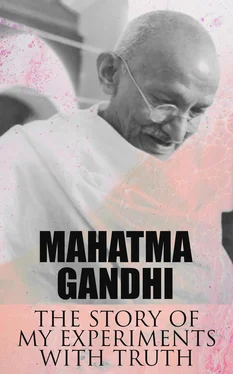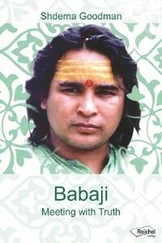Mahatma Gandhi - The Story of My Experiments with Truth
Здесь есть возможность читать онлайн «Mahatma Gandhi - The Story of My Experiments with Truth» — ознакомительный отрывок электронной книги совершенно бесплатно, а после прочтения отрывка купить полную версию. В некоторых случаях можно слушать аудио, скачать через торрент в формате fb2 и присутствует краткое содержание. Жанр: unrecognised, на английском языке. Описание произведения, (предисловие) а так же отзывы посетителей доступны на портале библиотеки ЛибКат.
- Название:The Story of My Experiments with Truth
- Автор:
- Жанр:
- Год:неизвестен
- ISBN:нет данных
- Рейтинг книги:5 / 5. Голосов: 1
-
Избранное:Добавить в избранное
- Отзывы:
-
Ваша оценка:
- 100
- 1
- 2
- 3
- 4
- 5
The Story of My Experiments with Truth: краткое содержание, описание и аннотация
Предлагаем к чтению аннотацию, описание, краткое содержание или предисловие (зависит от того, что написал сам автор книги «The Story of My Experiments with Truth»). Если вы не нашли необходимую информацию о книге — напишите в комментариях, мы постараемся отыскать её.
The Story of My Experiments with Truth — читать онлайн ознакомительный отрывок
Ниже представлен текст книги, разбитый по страницам. Система сохранения места последней прочитанной страницы, позволяет с удобством читать онлайн бесплатно книгу «The Story of My Experiments with Truth», без необходимости каждый раз заново искать на чём Вы остановились. Поставьте закладку, и сможете в любой момент перейти на страницу, на которой закончили чтение.
Интервал:
Закладка:
Such cleanliness is quite essential no doubt, but Western medical science has taught us that all the functions, including a bath, can be done in bed with the strictest regard to cleanliness, and without the slightest discomfort to the patient, the bed always remaining spotlessly clean. I should regard such cleanliness as quite consistent with Vaishnavism. But my father’s insistence on leaving the bed only struck me with wonder then, and I had nothing but admiration for it.
The dreadful night came. My uncle was then in Rajkot. I have a faint recollection that he came to Rajkot having had news that my father was getting worse. The brothers were deeply attached to each other. My uncle would sit near my father’s bed the whole day, and would insist on sleeping by his bed-side after sending us all to sleep. No one had dreamt that this was to be the fateful night. The danger of course was there.
It was 10:30 or 11 p.m. I was giving the massage. My uncle offered to relieve me. I was glad and went straight to the bed-room. My wife, poor thing, was fast asleep. But how could she sleep when I was there? I woke her up. In five or six minutes, however, the servant knocked at the door. I started with alarm. ‘Get up,’ he said, ‘Father is very ill.’ I knew of course that he was very ill, and so I guessed what ‘very ill’ meant at that moment. I sprang out of bed.
‘What is the matter? Do tell me!’
‘Father is no more.’
So all was over! I had but to wring my hands. I felt deeply ashamed and miserable. I ran to my father’s room. I saw that, if animal passion had not blinded me, I should have been spared the torture of separation from my father during his last moments. I should have been massaging him, and he would have died in my arms. But now it was my uncle who had had this privilege. He was so deeply devoted to his elder brother that he had earned the honour of doing him the last services! My father had forebodings of the coming event. He had made a sign for pen and paper, and written: ‘Prepare for the last rites.’ He had then snapped the amulet off his arm and also his gold necklace of tulasi-beads and flung them aside. A moment after this he was no more.
The shame, to which I have referred in a foregoing chapter, was this shame of my carnal desire even at the critical hour of my father’s death, which demanded wakeful service. It is a blot I have never been able to efface or forget, and I have always thought that, although my devotion to my parents knew no bounds and I would have given up anything for it, yet it was weighed and found unpardonably wanting because my mind was at the same moment in the grip of lust. I have therefore always regarded myself as a lustful, though a faithful, husband. It took me long to get free from the shackles of lust, and I had to pass through many ordeals before I could overcome it.
Before I close this chapter of my double shame, I may mention that the poor mite that was born to my wife scarcely breathed for more than three or four days. Nothing else could be expected. Let all those who are married be warned by my example.
X GLIMPSES OF RELIGION
Table of Contents
From my sixth or seventh year up to my sixteenth I was at school, being taught all sorts of things except religion. I may say that I failed to get from the teachers what they could have given me without any effort on their part. And yet I kept on picking up things here and there from my surroundings. The term ‘religion’ I am using in its broadest sense, meaning thereby self-realization or knowledge of self.
Being born in the Vaishnava faith, I had often to go to the Haveli. But it never appealed to me. I did not like its glitter and pomp. Also I heard rumours of immorality being practised there, and lost all interest in it. Hence I could gain nothing from the Haveli.
But what I failed to get there I obtained from my nurse, an old servant of the family, whose affection for me I still recall. I have said before that there was in me a fear of ghosts and spirits. Rambha, for that was her name, suggested, as a remedy for this fear, the repetition of Ramanama. I had more faith in her than in her remedy, and so at a tender age I began repeating Ramanama to cure my fear of ghosts and spirits. This was of course short-lived, but the good seed sown in childhood was not sown in vain. I think it is due to the seed sown by that good woman Rambha that today Ramanama is an infallible remedy for me.
Just about this time, a cousin of mine who was a devotee of the Ramayana arranged for my second brother and me to learn Ram Raksha. We got it by heart, and made it a rule to recite it every morning after the bath. The practice was kept up as long as we were in Porbandar. As soon as we reached Rajkot, it was forgotten. For I had not much belief in it. I recited it partly because of my pride in being able to recite Ram Raksha with correct pronunciation.
What, however, left a deep impression on me was the reading of the Ramayana before my father. During part of his illness my father was in Porbandar. There every evening he used to listen to the Ramayana. The reader was a great devotee of Rama,—Ladha Maharaj of Bileshvar. It was said of him that he cured himself of his leprosy not by any medicine, but by applying to the affected parts bilva leaves which had been cast away after being offered to the image of Mahadeva in Bileshvar temple, and by the regular repetition of Ramanama. His faith, it was said, had made him whole. This may or may not be true. We at any rate believed the story. And it is a fact that when Ladha Maharaj began his reading of the Ramayana his body was entirely free from leprosy. He had a melodious voice. He would sing the Dohas (couplets) and Chopais (quatrains), and explain them, losing himself in the discourse and carrying his listeners along with him. I must have been thirteen at that time, but I quite remember being enraptured by his reading. That laid the foundation of my deep devotion to the Ramayana. Today I regard the Ramayana of Tulsidas as the greatest book in all devotional literature.
A few months after this we came to Rajkot. There was no Ramayana reading there. The Bhagavat, however, used to be read on every Ekadashi 8day. Sometimes I attended the reading, but the reciter was uninspiring. Today I see that the Bhagavat is a book which can evoke religious fervour. I have read it in Gujarati with intense interest. But when I heard portions of the original read by Pandit Madan Mohan Malaviya during my twenty-one days’ fast, I wished I had heard it in my childhood from such a devotee as he is, so that I could have formed a liking for it at an early age. Impressions formed at that age strike roots deep down into one’s nature, and it is my perpetual regret that I was not fortunate enough to hear more good books of this kind read during that period.
In Rajkot, however, I got an early grounding in toleration for all branches of Hinduism and sister religions. For my father and mother would visit the Haveli as also Shiva’s and Rama’s temples, and would take or send us youngsters there. Jain monks also would pay frequent visits to my father, and would even go out of their way to accept food from us—non-Jains. They would have talks with my father on subjects religious and mundane.
He had, besides, Musalman and Parsi friends, who would talk to him about their own faiths, and he would listen to them always with respect, and often with interest. Being his nurse, I often had a chance to be present at these talks. These many things combined to inculcate in me a toleration for all faiths.
Only Christianity was at the time an exception. I developed a sort of dislike for it. And for a reason. In those days Christian missionaries used to stand in a corner near the high school and hold forth, pouring abuse on Hindus and their gods. I could not endure this. I must have stood there to hear them once only, but that was enough to dissuade me from repeating the experiment. About the same time, I heard of a well known Hindu having been converted to Christianity. It was the talk of the town that, when he was baptized, he had to eat beef and drink liquor, that he also had to change his clothes, and that thenceforth he began to go about in European costume including a hat. These things got on my nerves. Surely, thought I, a religion that compelled one to eat beef, drink liquor, and change one’s own clothes did not deserve the name. I also heard that the new convert had already begun abusing the religion of his ancestors, their customs and their country. All these things created in me a dislike for Christianity.
Читать дальшеИнтервал:
Закладка:
Похожие книги на «The Story of My Experiments with Truth»
Представляем Вашему вниманию похожие книги на «The Story of My Experiments with Truth» списком для выбора. Мы отобрали схожую по названию и смыслу литературу в надежде предоставить читателям больше вариантов отыскать новые, интересные, ещё непрочитанные произведения.
Обсуждение, отзывы о книге «The Story of My Experiments with Truth» и просто собственные мнения читателей. Оставьте ваши комментарии, напишите, что Вы думаете о произведении, его смысле или главных героях. Укажите что конкретно понравилось, а что нет, и почему Вы так считаете.












